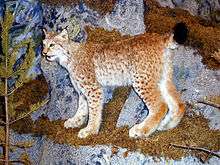Northern lynx
The northern lynx (Lynx lynx lynx) is a medium-sized subspecies of the Eurasian lynx (Lynx lynx).
| Northern lynx | |
|---|---|
 | |
| Scientific classification | |
| Kingdom: | Animalia |
| Phylum: | Chordata |
| Class: | Mammalia |
| Order: | Carnivora |
| Suborder: | Feliformia |
| Family: | Felidae |
| Subfamily: | Felinae |
| Genus: | Lynx |
| Species: | |
| Subspecies: | L. l. lynx |
| Trinomial name | |
| Lynx lynx lynx (Linnaeus, 1758) | |
Range and habitat
The northern lynx is found in Fennoscandia, the Baltic States, the northern and central part of Poland (including Białowieża Forest and Kampinos National Park), Belarus, the European part of western, northern, central and eastern Russia, the Ural Mountains, and Western Siberia east to the Yenisei River.[1]
Prey of the northern lynx
Northern lynx prey largely on small to fairly large sized mammals and birds. Among the recorded prey items are European and mountain hares, red squirrels, Siberian flying squirrels, dormice and other rodents, mustelids (such as martens), grouse, red foxes, raccoon dogs, wild boar, moose, roe deer, red deer and other medium-sized ungulates. Semi-domestic reindeer (Rangifer tarandus) are the main prey for the northern lynx in northern Scandinavia.[2]
Predators and enemies of the northern lynx
In Russian forests, the most important predator of the Eurasian lynx is the grey wolf[3]. Wolves kill and eat lynxes that fail to escape into trees. Lynx populations decrease when wolves appear in a region and are likely to take smaller prey where wolves are active.[3][4]
Wolverines are perhaps the most dogged of competitors for kills, often stealing lynx kills. Lynxes tend to actively avoid encounters with wolverines, but may sometimes fight them if defending kittens. Instances of predation on lynx by wolverines may occur, even perhaps on adults, but unlike wolf attacks on lynx are extremely rare if they do in fact occur[5][3]. One study in Sweden found that out of 33 deaths of lynx of a population being observed, one was probably killed by a wolverine.[6] Another known instance of predation by an adult wolverine on an adult lynx was reportedly seen in the Pechora River area, although this appeared to merely be an anecdotal claim.[3] There are no known instances of lynx preying on a wolverine.[3][7]
Brown bears, although not (so far as is known) predators of Eurasian lynx, are in some areas semi-habitual usurpers of ungulate kills by lynxes, not infrequently before the cat has had a chance to consume its kill itself.[8]
See also
| Wikimedia Commons has media related to Lynx lynx lynx. |
References
- iucnredlist.org / Lynx lynx
- Mattisson, Jenny; Odden, John; Nilsen, Erlend B.; Linnell, John D.C.; Persson, Jens; Andrén, Henrik (2011). "Factors affecting Eurasian lynx kill rates on semi-domestic reindeer in northern Scandinavia: Can ecological research contribute to the development of a fair compensation system?". Biological Conservation. 144 (12): 3009–3017. doi:10.1016/j.biocon.2011.09.004.
- Heptner, V.G. and Sludskii, A.A. (1992). Mammals of the Soviet Union. Vol. II Part 2 Carnivora: Hyenas and Cats. New Delhi: Amerind Publishing Co pp. 625.
- Luigi Boitani (23 November 2003). Wolves: Behavior, Ecology, and Conservation. University of Chicago Press. pp. 265–. ISBN 978-0-226-51696-7.
- Carnivores of the World by Dr. Luke Hunter. Princeton University Press (2011), ISBN 978-0-691-15228-8
- Andrén, Henrik; Linnell, John D.C.; Liberg, Olof; Andersen, Reidar; Danell, Anna; Karlsson, Jens; Odden, John; Moa, Pål F.; Ahlqvist, Per; Kvam, Tor; Franzén, Robert; Segerström, Peter (2006). "Survival rates and causes of mortality in Eurasian lynx (Lynx lynx) in multi-use landscapes". Biological Conservation. 131: 23–32. doi:10.1016/j.biocon.2006.01.025.
- Andrén, Henrik; Persson, Jens; Mattisson, Jenny; Danell, Anna C. (2011). "Modelling the combined effect of an obligate predator and a facultative predator on a common prey: Lynx lynx lynx and wolverine Gulo gulo predation on reindeer Rangifer tarandus". Wildlife Biology. 17: 33–43. doi:10.2981/10-065.
- Krofel, Miha; Kos, Ivan; Jerina, Klemen (2012). "The noble cats and the big bad scavengers: Effects of dominant scavengers on solitary predators". Behavioral Ecology and Sociobiology. 66 (9): 1297–1304. doi:10.1007/s00265-012-1384-6.
External links
- Pedersen, Vegar A.; Linnell, John D.C.; Andersen, Reidar; Andrén, Henrik; Lindén, Mats; Segerström, Peter (1999). "Winter lynx Lynx lynx predation on semi-domestic reindeer Rangifer tarandus in northern Sweden". Wildlife Biology. 5: 203. doi:10.2981/wlb.1999.025.
- highlandwildlifepark.org.uk / Northern Lynx
- telegraph.co.uk / Call for lynx to be released in Scotland branded 'brazen and presumptuous'. By Auslan Cramb, Scottish Correspondent, 9 August 2017;